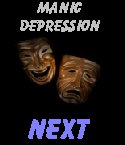A Simple Charter
What is Bipolar Disorder?

Bipolar
disorder, also known as manic depressive illness, is a common illness characterised
by recurrent episodes of mania and major depression. An affected personís mood
can swing from excessive highs (mania) to profound hopelessness (depression),
usually with periods of normal mood in between. Some individuals may exhibit
mixed symptoms of both mania and depression at the same time, while others may
have more moderate symptoms of mania (hypomania). The type, severity and duration
of mood episodes experienced can vary. Some individuals may have a predominance
of either mania or depression, whereas some sufferers may experience equal numbers
of both. The mood episodes can last for a few days to as long as several months,
particularly when left untreated or not treated effectively. Depressions tend
to last longer than manic episodes. Typically, a person with bipolar disorder
can expect an average of ten episodes of mania or depression in his or her lifetime
but some sufferers experience much more frequent mood episodes. The frequency
of episodes tends to increase with time and individuals who experience four
or more episodes in a year are said to have rapid cycling.





